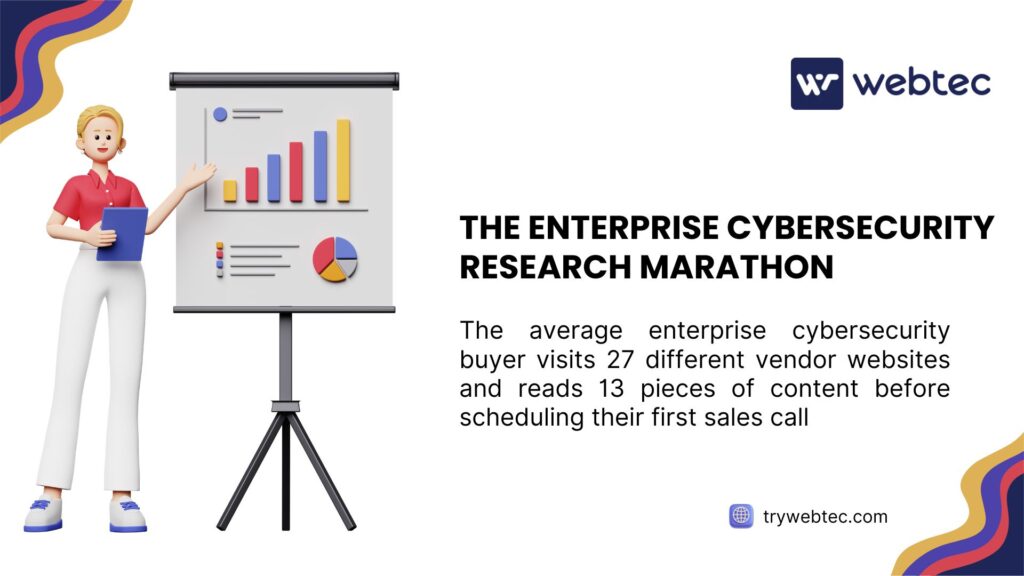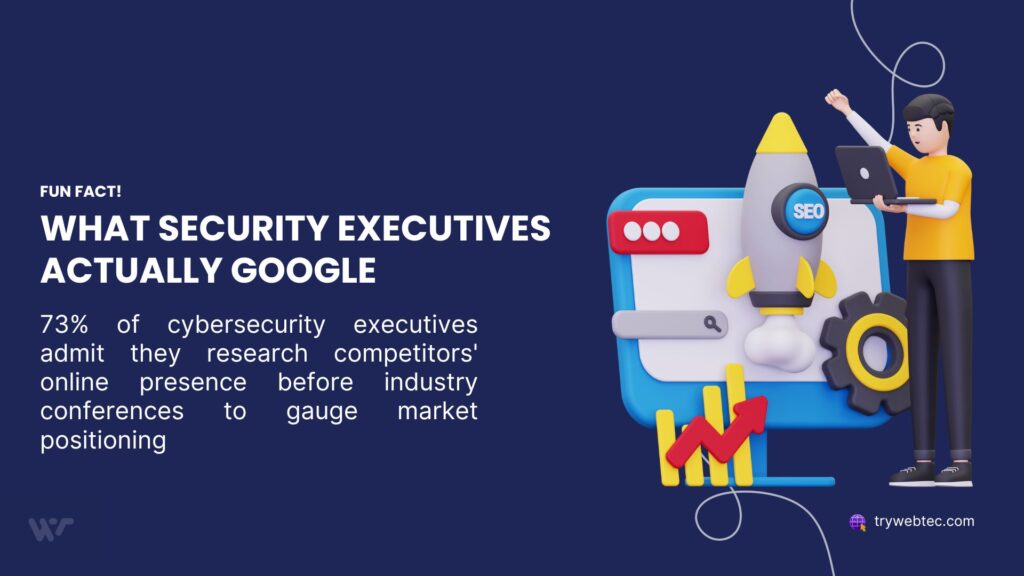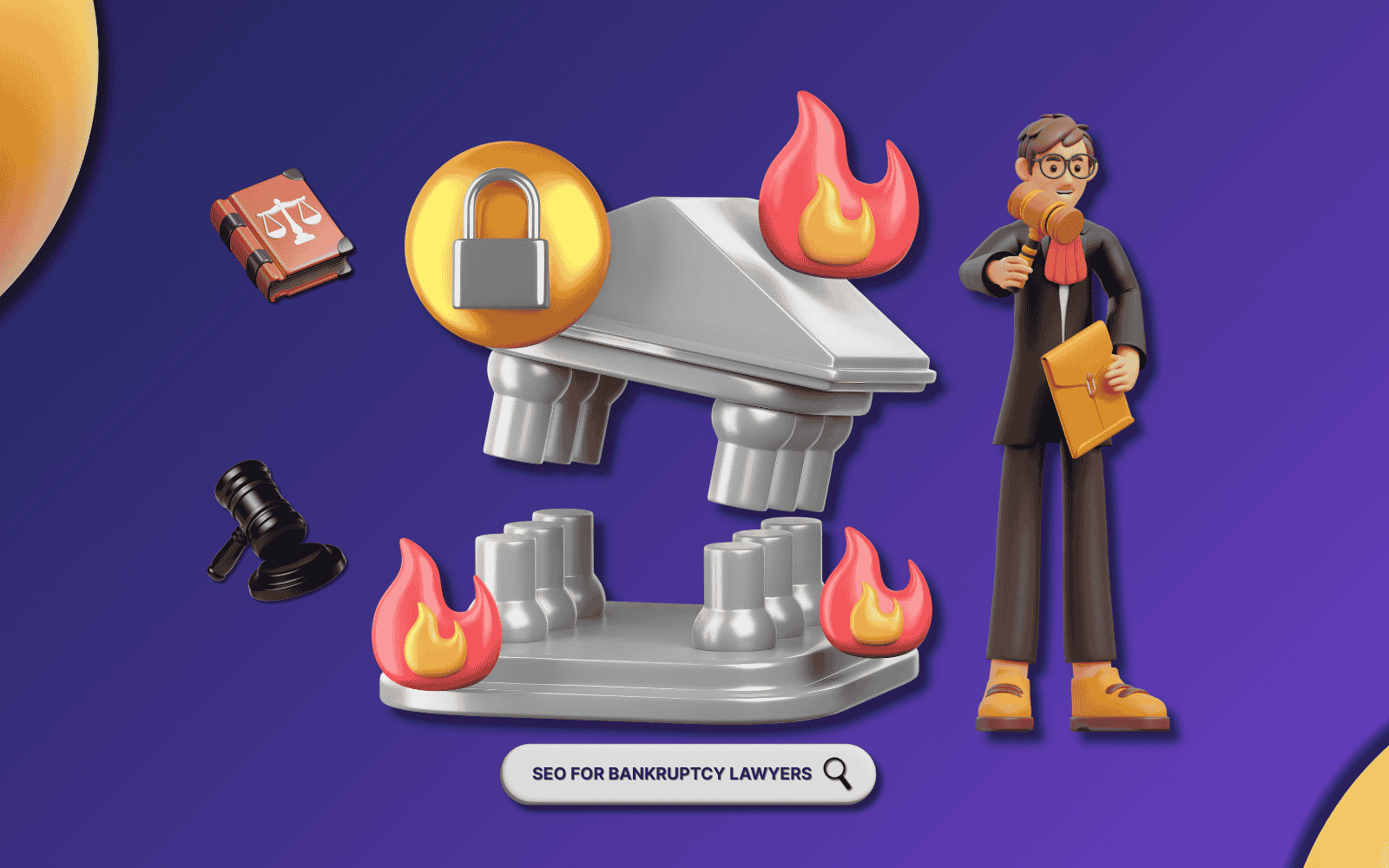Did you know that 84% of businesses research cybersecurity solutions online before making purchase decisions?
More concerning: 67% of cybersecurity companies lose high-value enterprise clients simply because prospects can’t find them when searching for security solutions.
The average cybersecurity contract ranges from $50,000-$500,000 annually. Missing just two enterprise prospects per month due to poor search visibility costs your firm $1.2M+ yearly in lost revenue.
This guide reveals proven SEO for cybersecurity strategies to rank higher for valuable security searches, attract qualified enterprise leads, and grow your cybersecurity business without burning through advertising budgets.

Why SEO for Cybersecurity Differs from Other B2B Marketing
Cybersecurity buyers follow unique research patterns that general B2B SEO strategies completely miss. Security decisions involve multiple stakeholders, extensive evaluation periods, and high-stakes outcomes.
These prospects research for months before contacting vendors. They evaluate technical capabilities, compliance requirements, and vendor credibility before scheduling initial calls.
Just like effective SEO for SaaS requires specialized approaches, cybersecurity marketing needs security-specific targeting strategies.
Cybersecurity SEO | General B2B SEO |
Compliance-focused searches | Feature-focused searches |
Multi-stakeholder evaluation | Single decision maker |
Risk-mitigation priority | ROI-focused messaging |
Extended research cycles | Shorter evaluation periods |
Technical depth required | Surface-level explanations |
Cybersecurity purchases also involve board-level approval for enterprise deals. Your content must speak to both technical teams and executive stakeholders.
Security buyers will travel globally to find the right vendor. They also pay premium prices when they see proven expertise and strong security outcomes.
Target High-Value Cybersecurity Keywords
Your SEO for cybersecurity strategy must target keywords that show serious interest in security solutions. These prospects don’t search for generic terms – they search for specific threats and compliance requirements.
Security teams search for the exact problems they need to solve. They already understand their vulnerabilities and want solutions that address specific security gaps.
- Threat-Specific Keywords
Cybersecurity buyers search for solutions to specific security threats and attack vectors. These searches bring you prospects who are ready to invest in security solutions.
Keyword Type | Examples | Search Intent |
Attack prevention | “ransomware protection”, “phishing prevention” | Active threat response |
Compliance needs | “GDPR compliance tools”, “SOC 2 audit preparation” | Regulatory requirements |
Industry security | “healthcare cybersecurity”, “financial security solutions” | Sector-specific needs |
Technical solutions | “endpoint detection response”, “SIEM implementation” | Solution evaluation |
Your content should demonstrate expertise in handling these specific security challenges. It should also showcase your success in protecting similar organizations.
- Enterprise Security Keywords
Enterprise cybersecurity searches often include scale indicators and stakeholder-specific terms. Target keywords that reflect enterprise buying patterns.
Large organizations search differently than small businesses. They focus on scalability, integration capabilities, and vendor stability.
Enterprise Search Pattern | Monthly Volume | Competition Level |
“enterprise cybersecurity solutions” | High | Very High |
“cybersecurity for Fortune 500” | Medium | High |
“scalable security architecture” | Medium | Medium |
“cybersecurity managed services” | High | High |
Target your city, industry verticals, and compliance frameworks that enterprise prospects recognize and require.
- Compliance-Driven Keywords
Many cybersecurity purchases are driven by compliance requirements rather than proactive security planning. Target keywords that reflect regulatory motivations.
Value-focused search patterns include:
- “HIPAA compliance cybersecurity”
- “PCI DSS security requirements”
- “ISO 27001 implementation”
- “SOC 2 Type 2 preparation”
Content addressing compliance builds credibility with procurement teams. It also helps justify security investments during budget approval processes.

Step 1: Research Your Cybersecurity Competition
Competitor analysis reveals which security firms dominate valuable cybersecurity searches. Study their content strategy to identify opportunities for your SEO for cybersecurity approach.
Look for gaps in their threat coverage. Find weak content that you can outperform with better technical resources and case studies.
- Analyze Their Security Content
Review which cybersecurity threats and solutions competitors target in their content. Missing or poorly covered threats represent immediate opportunities.
Focus on high-stakes security areas where you have strong expertise and proven client results to showcase.
Analysis Area | What to Look For | Opportunity Indicator |
Threat coverage | Solution breadth | Missing security areas |
Case studies | Client results | Generic success stories |
Technical depth | Implementation details | Surface-level explanations |
Compliance focus | Regulatory expertise | Incomplete frameworks |
Many cybersecurity firms create generic content that doesn’t address specific industry challenges or advanced persistent threats.
- Study Their Enterprise Positioning
Check how competitors position themselves for enterprise cybersecurity searches. Look at their client testimonials and case study focus.
Many cybersecurity companies neglect enterprise-specific messaging. This creates opportunities for firms that understand enterprise security requirements.
Similar to SEO for lawyers requiring specialized positioning, cybersecurity firms need focused expertise areas rather than general security advice.
- Examine Their Technical Authority
Cybersecurity prospects need extensive technical validation before engaging vendors. Weak technical content from competitors creates authority opportunities.
Address advanced threats that competitors oversimplify. Provide detailed implementation guidance that demonstrates real security expertise.

Step 2: Create Threat-Focused Content
SEO for cybersecurity needs detailed threat analysis and proven defense strategies. Prospects want to understand their vulnerabilities before evaluating security solutions.
Pages with basic security information don’t work for enterprise buyers. They need detailed technical explanations and implementation roadmaps.
- Develop Threat-Specific Landing Pages
Create dedicated pages for each major cybersecurity threat you address. These pages should target specific threats while showcasing your defense capabilities.
Each landing page needs detailed threat analysis, defense strategies, and clear next steps for concerned prospects.
Landing Page Element | Purpose | Prospect Benefit |
Threat analysis | Show expertise depth | Builds confidence in capabilities |
Defense strategies | Explain protection methods | Reduces anxiety about vulnerabilities |
Implementation costs | Address budget concerns | Makes security more accessible |
Client case studies | Provide social proof | Increases trust in effectiveness |
- Create Educational Blog Content
Cybersecurity blog posts help demonstrate your technical expertise. They also help you rank for more threat-specific keywords.
Write about what security teams actually need to know. Skip marketing fluff that wastes their time.
Popular cybersecurity blog topics include:
- Threat landscape analysis
- Compliance implementation guides
- Security architecture best practices
- Incident response procedures
These posts should naturally connect to your main cybersecurity services. They should also link to relevant solution pages when appropriate.
- Optimize Technical Content for Search
Technical optimization becomes critical for SEO for cybersecurity success. Search engines need to understand your security expertise to rank it properly.
Use descriptive titles and meta descriptions that include relevant cybersecurity keywords. Technical diagrams should include security-focused alt text.
Content Type | SEO Best Practice | Example Alt Text |
Network diagrams | Include security focus | “Zero trust network architecture diagram” |
Threat analysis | Describe attack vectors | “Advanced persistent threat kill chain stages” |
Solution screenshots | Include product context | “SIEM dashboard detecting suspicious activity” |
Team photos | Include expertise areas | “Cybersecurity incident response team” |
Step 3: Build Authority for Security Solutions
Local authority building works differently for cybersecurity than other industries. Your prospects may be global but still search with geographic and industry context.
Build authority for cybersecurity solutions in your target markets through specialized content and industry partnerships.
- Target Industry-Specific Security Keywords
Combine cybersecurity terms with industry verticals to capture sector-specific search traffic. These keywords have lower competition than generic security terms.
Similar to how SEO for startups requires niche focus, cybersecurity marketing needs industry-specific targeting.
Industry Keyword Strategy | Examples | Target Audience |
Sector + security | “healthcare cybersecurity”, “banking security” | Industry professionals |
Compliance focus | “HIPAA security solutions”, “PCI compliance” | Regulatory teams |
Threat + industry | “healthcare ransomware protection” | Sector-specific threats |
Scale + sector | “enterprise healthcare security” | Large organizations |
- Partner with Industry Organizations
Cybersecurity often requires coordination with compliance auditors, industry associations, and technology partners. These partnerships provide credibility and link opportunities.
Consider collaborative content with industry associations that serve your target markets.
Effective SEO for dental practices benefits from healthcare industry connections, and cybersecurity firms benefit similarly from sector-specific relationships.
- Sponsor Security Events
Get involved in cybersecurity conferences, industry summits, and security training events. These activities help you meet prospects who need security solutions.
You also get valuable backlinks from event organizers and speaking opportunities. This helps your Google rankings for industry searches.
Event Type | SEO Benefit | Target Audience |
Security conferences | Industry backlinks | Security professionals |
Compliance seminars | Regulatory authority | Compliance teams |
Industry summits | Sector credibility | Industry executives |
Training workshops | Educational links | Technical teams |

Step 4: Optimize for High-Converting Security Searches
SEO for cybersecurity requires optimization for searches that indicate serious security concerns rather than just information seeking.
Focus on keywords and content that attract prospects ready to invest in cybersecurity solutions immediately.
- Target Assessment-Intent Keywords
Searches that indicate readiness for security evaluation convert much higher than general information searches. Target these high-intent terms specifically.
Examples include:
- “cybersecurity risk assessment”
- “security audit services”
- “penetration testing consultation”
- “cybersecurity vendor evaluation”
Content targeting these terms should make consultation booking as easy as possible with clear calls-to-action.
- Create Solution Comparison Content
Cybersecurity prospects compare multiple vendors and approaches before making decisions. Smart comparison content positions your firm favorably against alternatives.
Write honest comparisons that highlight your unique security expertise without disparaging other approaches directly.
Comparison Type | SEO Value | Content Focus |
Solution approaches | High traffic | In-house vs managed security |
Technology options | Medium traffic | Tool comparisons |
Service models | High conversion | Consulting vs managed services |
Compliance frameworks | Medium traffic | Regulatory approaches |
- Optimize for Mobile Security Searches
Many cybersecurity searches happen on mobile devices as executives research security concerns during travel or after security incidents.
Your technical content must load quickly and display properly on mobile devices to capture these urgent prospects.
Just like SEO for plumbers requires mobile optimization for emergency searches, cybersecurity firms need mobile-ready content for security incidents.
Step 5: Track Cybersecurity SEO Performance
Measuring SEO for cybersecurity requires different metrics than general B2B companies. Focus on metrics that connect to high-value security consultations and enterprise contracts.
Track consultation requests and security-specific inquiries rather than just general contact form submissions.
- Key Cybersecurity SEO Metrics
Check these numbers every month to see how your cybersecurity SEO actually works:
Metric | What It Shows | Target Goal |
Organic traffic to solution pages | Interest in security services | 25%+ monthly growth |
Security consultation requests | Quality lead generation | 60%+ of total consultations |
Threat-specific form submissions | Urgent security needs | 20%+ conversion rate |
Enterprise contract starts | Revenue impact | 70%+ from organic search |
Industry search rankings | Sector visibility | Top 5 for target keywords |
- Calculate Security ROI
Track revenue from high-value cybersecurity contracts that originate from organic search. Compare this to your SEO investment to calculate return on investment.
Remember that cybersecurity clients often expand their engagements and refer to other organizations. One client might lead to multiple contracts over time.
Cybersecurity services generate significantly more revenue per client than basic IT services. This makes it worthwhile to invest more in specialized SEO for cybersecurity campaigns.
- Monitor Threat Landscape
Track how your rankings perform for emerging cybersecurity threats and attack vectors. Look for opportunities to capture search traffic from new security concerns.
Cybersecurity threats evolve constantly. New attack methods create fresh keyword opportunities that your competitors might miss.
Advanced SEO for Cybersecurity Tactics
After you master the basics, you can implement more advanced SEO tactics for cybersecurity firms. These methods require more investment but can help you outperform larger security companies.
You’ll need more time and resources for these tactics. But they usually deliver better results for cybersecurity firms than basic SEO approaches.
- Develop Security Content Clusters
Organize cybersecurity content into topic clusters around major threat themes. This approach helps search engines understand your security expertise areas.
Create pillar pages covering broad cybersecurity topics with supporting pages that dive deeper into specific threats and defense strategies.
Link related cybersecurity content to distribute page authority and keep visitors engaged with your security expertise.
- Target Compliance-Specific Keywords
Cybersecurity prospects fall into distinct compliance requirements with different security priorities. Create content that addresses regulation-specific cybersecurity considerations.
Examples include:
- “GDPR cybersecurity requirements”
- “HIPAA security risk assessment”
- “SOC 2 cybersecurity controls”
- “PCI DSS network security”
Write content that speaks directly to each compliance framework’s specific security requirements and audit expectations.
- Optimize for Voice Search
More security teams now ask voice assistants about cybersecurity threats and solutions. They use natural conversation instead of typed keywords.
Focus on the questions people actually ask out loud about security. Think about how someone would talk to their phone about cybersecurity concerns.
Similar to effective SEO for orthodontists requiring adaptation to new search behaviors, cybersecurity SEO must evolve with voice search adoption.
Common SEO Mistakes for Cybersecurity Firms
Most cybersecurity companies make critical SEO mistakes that limit their ability to attract high-value enterprise security clients.
Avoid these common pitfalls to outperform competitors in cybersecurity searches.
- Don’t Focus Only on Technical Features
Generic security features rarely attract cybersecurity prospects who search for specific threat solutions. Target threat-specific terms instead.
Cybersecurity buyers use different language and search patterns than general IT buyers who need basic technology solutions.
- Avoid Poor Case Study Optimization
Low-quality case studies hurt both SEO performance and prospect conversion. Invest in detailed success stories that showcase your security expertise.
Search engines consider engagement metrics when ranking security content. Compelling case studies keep visitors on your site longer.
- Don’t Ignore Prospect Questions
Cybersecurity purchases require extensive due diligence to justify security investments. Provide detailed answers to common prospect questions.
Educated prospects make faster security decisions and become stronger advocates for your firm through positive reviews and referrals.
Common Mistake | Why It Fails | Better Approach |
Technical jargon | Prospects don’t search this way | Business-friendly language |
Generic security topics | Too much competition | Threat-specific content |
No compliance focus | Misses regulatory drivers | Framework-targeted content |
Weak mobile experience | Mobile searches fail | Mobile optimization |
Poor case studies | Reduces credibility | Detailed success stories |
Many successful SEO for personal injury lawyers strategies focus on specific case types rather than general legal services. Cybersecurity SEO works similarly with threat specialization.
Tools for SEO for Cybersecurity Success
The right tools make SEO for cybersecurity more efficient and effective. Focus on tools that help optimize security content and track threat-specific performance.
Start with Google Analytics and Search Console to understand how prospects find and interact with your cybersecurity content.
- Security SEO Tools
Security SEO tools help track your performance for threat-based cybersecurity searches compared to other firms in your market.
These tools also help identify opportunities to improve your technical content optimization and industry directory listings.
- Technical Content Management
Documentation systems help organize and optimize large libraries of security guides, threat analyses, and implementation procedures.
Social media tools can amplify your security expertise while driving traffic back to your optimized solution pages.
- Competition Analysis Tools
SEO tools help identify which cybersecurity keywords competitors target and which threats drive their traffic.
Link analysis reveals opportunities to earn backlinks from security publications and industry websites that serve similar audiences.
Just like effective SEO for accountants requires specialized tracking, cybersecurity firms need tools that provide security-focused insights rather than general data.
- Analytics and Tracking
Set up proper tracking before you start major SEO efforts for cybersecurity firms. You need baseline data to measure improvement accurately.
Custom dashboards help you monitor the metrics that matter most for security lead generation. Focus on tracking data that connects to actual consultation bookings.
Regular reporting helps you identify threat trends and adjust strategies based on performance data. Monthly SEO reports help keep stakeholders informed about lead generation progress.
Tool Category | Purpose | Key Features |
Threat monitoring | Track emerging security trends | Real-time threat data |
Analytics | Measure security content performance | Conversion tracking |
Competition | Monitor security competitor strategies | Keyword and content analysis |
Technical | Optimize security documentation | Content organization |

Want Qualified Prospects, Higher Rankings, and No Wasted Time on Cybersecurity SEO That Doesn’t Work?
If you want to stop losing $500,000+ enterprise security contracts to competitors, stop creating content that prospects never find, and start attracting organizations who invest in premium cybersecurity solutions, then we can help you.
Webtec offers proven SEO for cybersecurity services specifically designed for security firms that want to dominate threat-related searches and compliance requirements.
Our data-driven approach has helped cybersecurity companies increase their qualified security consultations by 250%+ through targeted organic search optimization that understands both security marketing and enterprise sales cycles.So, if you’re ready to scale your cybersecurity firm with qualified prospects who actually sign high-value security contracts, discover how our specialized approach can transform your security marketing results now!

















